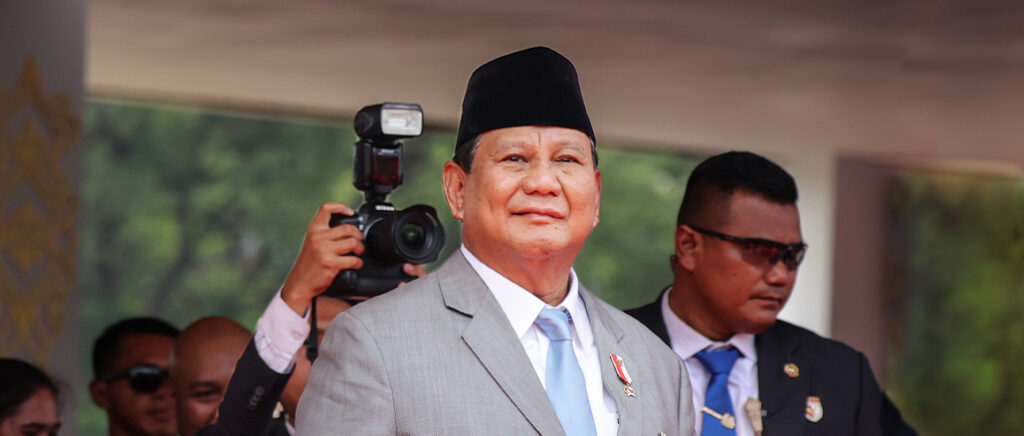Since October 20, 2024, Indonesia, the world’s largest Muslim-majority country and Southeast Asia’s largest economy, has had a new president and a vice president: Prabowo Subianto (b. 1951, locally known as Prabowo) and Gibran Rakabuming Raka (b. 1987, locally known as Gibran). Having a strong military background with various high-rank posts in the Special Forces (Kopassus) and the Army Strategic Reserve Command (Kostrad) during the reign of the late despotic ruler Suharto (Prabowo’s former father-in-law), Prabowo was a former Minister of Defense under President Joko Widodo (popularly known as Jokowi) who served as the seventh president of Indonesia from 2014 to 2024. Prabowo is also the General Chairman of the Gerindra Party, a nationalist, right-wing populist political party. Founded by Prabowo and his allies in 2008, Gerindra is currently the third largest party in the parliament (DPR) after PDI-P and Partai Golkar. Furthermore, Gibran was the ex-mayor of Surakarta in Central Java and Jokowi’s eldest child.
The Composition of Prabowo’s Cabinet
After the General Elections Commission (KPU) officially announced and assigned Prabowo as the eighth president of Indonesia, he appointed 136 officials consisting of 48 ministers, 56 deputy ministers, 5 heads of government agencies or ministerial-level officials, and 27 figures for various professions such as special advisors to the president, special delegates to the president, and chairs of national agencies. 1 With this number to date, Prabowo’s cabinet is perhaps the largest-ever cabinet in the country’s modern political history. Prabowo named his “fat” cabinet the “Red and White Cabinet,” symbolizing the colors of the Indonesian flag. Prabowo argued that the composition of large members in his cabinet aimed to create a strong government that would unite and reflect Indonesia’s diverse societies and political interests. 2
Prabowo’s cabinet features various professions including politicians, bureaucrats, (ex-) military or police personnel, business people, activists, academics, and practitioners. Moreover, his cabinet represents a mixture of figures including Prabowo’s stalwarts, the coalition of seven political parties who supported his candidacy during February’s presidential election, social and religious organizations (e.g., Nahdlatul Ulama, Muhammadiyah, HMI, PMII, among others), some of his rivals during the election (e.g., Muhaimin Iskandar, the General Chairman of the National Awakening Party, who became the running mate of Anies Baswedan), and Jokowi’s loyalists, particularly his former ministers.
Indeed, a substantial number of Jokowi’s key ministers have been reappointed as Prabowo’s ministers and have strategic and crucial positions in the ministry (e.g., Sri Mulyani, Tito Karnavian, Erick Thohir, Bahlil Lahadia, Pratikno, Airlangga Hartarto, Agus Gumiwang Kartasasmita, among others), a sign of Jokowi’s strong influence on Prabowo. The accommodation of “Jokowi’s men” in Prabowo’s cabinet can be seen as a political compensation to Jokowi for his tacit backing and endorsement of Prabowo during the election.
Prabowo’s Weaknesses and Strengths
People might wonder whether Indonesia’s future will be better or worse under Prabowo. Here are some of Prabowo’s weaknesses and strengths to assess his capacity and qualifications.
Pessimists and critics will query Prabowo’s credentials to run this vast archipelagic country with more than 280 million population due to his negative reputation and bitter track records in the past. These accounts include some well-known issues related to accusations of human rights abuse. For example, Prabowo was alleged of capturing and abducting activists (including students) and orchestrating the 1998 violent riots and mass rapes targeting Chinese women and properties at the end of Suharto’s rule, accusations he repeatedly denied. Prabowo was also involved in a counter-insurgency operation in East Timor that claimed hundreds of lives, including the carnage of a dozen people (women and children included) in 1983. 3 Furthermore, Prabowo made alliances with intolerant factions and radical Islamists during the 2019 presidential election, the most chaotic and brutal-ever presidential election and campaign in Indonesia’s post-New Order history. Equally important, Prabowo’s party was deemed responsible for violent, dirty, and racist campaigns and mass disturbances during Jakarta’s 2017 gubernatorial election, the country’s worst-ever gubernatorial election.
Interestingly, notwithstanding the accusations of his unpleasant experiences in the past decades, Prabowo currently receives popular and extensive support from the Indonesian populace that can be used as a “social capital” to back his rule, policies, programs, and agenda. Backed by Jokowi, Prabowo became president after winning the election, receiving nearly 100 million (around 96.214.691) voters, or 58.59 percent of the ballot. Prabowo-Gibran’s rivals received 24.95 percent (for Anies Baswedan-Muhaimin Iskandar) and 16.47 percent (for Ganjar Pranowo-Mahfud MD). 4 Remarkably, more than half of voters in 35 provinces cast their ballot for Prabowo-Gibran. This means that only in 3 provinces Prabowo-Gibran received support from less than 50 percent of voters.
What made Prabowo receive overwhelming support today, although he previously failed several times, either as the candidate for president or vice president? At this point, Jokowi’s backing was a crucial factor for Prabowo’s victory. Without Jokowi’s (tacit) support, it was almost impossible for Prabowo to win the contest of the 2024 presidential election. In fact, in the past two presidential elections in 2014 and 2019 in which Prabowo also ran the candidacy, he was bitterly defeated by Jokowi, even though a coalition of numerous political parties had supported Prabowo. Jokowi’s support means that Prabowo will receive support from Jokowi’s enthusiastic followers and loyalists who are still widespread in the country, both ordinary people and elite members of society. Indeed, Jokowi so far remains a popular leader, albeit some elements and factions in society have criticized his rule in recent years. Critics, for instance, said that, despite making the country strong in economic growth and massive infrastructure development beyond Java, Jokowi left huge financial debts, roused old-time patronage and dynastic politics, damaged democracy and democratization processes, and diminished the integrity of courts and other state institutions. 5
Furthermore, survey findings from multiple noted institutions such as Kompas, the country’s respected national media, indicate significant public support toward Prabowo. For example, a survey conducted in September 2024 revealed that 84.1 percent of respondents of all categories (male and female; youth and adult; low, middle, and high class; educated and uneducated) see positively toward Prabowo’s future role as a “captain” of the “Indonesian ship.” Seven out of ten respondents also view Gibran positively. Around 84.7 percent of respondents were confident that Prabowo could defend and protect the country from home and foreign disturbers, and 80.2 percent believed that Probowo could increase Indonesian dignity and prestige in the international society. Additionally, 76.4 percent of respondents believed Prabowo could maintain the country’s political stability and national security. Over 70 percent of respondents are also convinced that Prabowo could overcome some major issues such as legal-related matters (74.5 percent), social welfare (73.1 percent), and economic growth (72.6 percent). 6
Why does Prabowo currently receive a positive image even though he has been dogged by charges of human rights abuses and violent riots for decades?
Here are some possible explanations. First, the accusation was perhaps only popular among elite members of society (politicians, activists, or academics), not the grassroots. Second, Indonesians generally find it easy to change their attitudes and perceptions, forget past experiences, and forgive someone who has a dark experience in the past but shows a positive development. Prabowo, on various occasions, has shown this changing behavior in recent years. Third, Prabowo’s calmness, elegance, and respect for his rivals during the presidential debates and campaigns in the 2024 election also contributed to this positive image. Fourth, Prabowo’s promises during the election might attract some segments of society, especially the grassroots (e.g., free education, free lunch, and increased salary for teachers and civil servants, etc.). Fifth, “the Jokowi effect” is undoubtedly significant in elevating Prabowo’s reputation.
Some Challenges for Prabowo’s Rule: Concluding Remarks
Although many Indonesians have high hopes for Prabowo-Gibran’s administration for the nation’s future, some fundamental issues can hamper their expectations and Prabowo’s confidence and promises. Here are some problems facing the country: the poverty rate is still high (9.03 percent in 2024), the unemployment rate in 2024 is 5.2 percent which is the highest in Southeast Asia, the adult illiteracy rate is 3.47 percent (in 2023), and the foreign debt is also high (around $403.9 billion in the first quarter of 2024). Moreover, corruption is still a common, ubiquitous practice in the country which is difficult to eradicate. Transparency International has scored Indonesia “34” (out of 100), meaning that the country’s rank is 115 out of 180 countries.
Equally important, the country has long faced intolerance, religious militancy, and anti-pluralist movements targeting specifically religious minority groups, including Muslim minorities (Shiites, Ahmadis, etc.). Religious freedom, including the right to build religious worship places, particularly for non-Muslims, still becomes a major issue in the country. The resurgence of multiple conservative, radical, and Islamist groups can disturb national security, civic peace, and social harmony. Additionally, separatist movements, particularly in Papua, are still a major issue that the current government needs to pay attention to.
Will Indonesia’s future be better and cleaner under Prabowo? Well, it is too early to evaluate and judge the success or unsuccess of Prabowo’s reign. The “fat” cabinet perhaps can make Prabowo’s administration stronger (as Prabowo said). But, the “bloated cabinet” can be ineffective and insufficient. It also can complicate bureaucracy and lengthen the policy-making process. The adding of many ministries and departments can also be costly in the sense of both energy and money spent. What is the point of appointing many officials if the appointment is only to incorporate and satisfy his loyalists and make his fans happy? Yet, time will answer these doubts.
Sumanto Al Qurtuby
Director of Nusantara Institute and Research Scholar at Kyoto University’s Center for Southeast Asian Studies. He has authored and edited numerous books on Indonesia and the Muslim world, including Terrorism and Counter-terrorism in Saudi Arabia and Indonesia (Palgrave Macmillan, 2022).
Banner photo: Jakarta, Indonesia. October 05, 2024. President-elect of the Republic of Indonesia, Prabowo Subianto at the 79th Anniversary of the TNI at Monas, Jakarta. Photo: Donny Hery, Shutterstock
Notes:
- Revo M, “Wow! Ada 136 Pejabat yang Dilantik Prabowo, Terbanyak dalam Sejarah?” CNBC Indonesia, 22 October 2014. https://www.cnbcindonesia.com/research/20241022120851-128-582009/wow-ada-136-pejabat-yang-dilantik-prabowo-terbanyak-dalam-sejarah (accessed October 23, 2024). ↩
- Niniek Karmini, “New President Prabowo Subianto Announces Indonesia’s Largest-ever Cabinet, with 109 Members.” Associated Press, October 21, 2024. https://apnews.com/article/indonesia-new-cabinet-prabowo-subianto-6b1f915d584c823aa16dbc38374c739c (Accessed October 22, 2024). ↩
- Gerry van Klinken, “Prabowo and Human Rights.” Inside Indonesia, April 27, 2014. https://www.insideindonesia.org/editions/elections-2014/prabowo-and-human-rights (Accessed October 22, 2024). ↩
- Ajid Fuad Muzaki, “KPU Resmi Tetapkan Prabowo-Gibran Sebagai Pemenang Pilpres 2024” [General Elections Commission of Indonesia Officially Assigned Prabowo-Gibran as the Winners of the 2024 Presidential Election]. Rumah Pemilu, April 24, 2024. https://rumahpemilu.org/kpu-resmi-tetapkan-prabowo-gibran-sebagai-pemenang-pilpres-2024/ (accessed October 21, 2024). ↩
- Kate Lamb and Ananda Teresia, “A Decade of Joko Widodo: Popular Indonesian Leader Leaves Rocky Legacy.” The Japan Times, October 14, 2024. https://www.japantimes.co.jp/news/2024/10/14/asia-pacific/politics/jokowi-indonesia-legacy-critics/ (Accessed October 22, 2024). ↩
- For a more detailed finding of the survey, see M Toto Suryaningtyas, “Survei ‘Kompas’: Modal Sosial Pemerintahan Baru Prabowo-Gibran” [Kompas Survey: A Social Capital for the New Government of Prabowo-Gibran]. Kompas, October 19, 2024. https://www.kompas.id/baca/riset/2024/10/19/survei-kompas-modal-sosial-pemerintahan-baru-prabowo-gibran?open_from=Section_Pemilu_2024 (accessed October 21, 2024); Vincentius Gitiyarko, “Survei ‘Kompas’ Pemerintahan Baru Prabowo Gibran: Kuat di Pertahanan, Tantangan di Kesejahteraan.” Kompas, October 20, 2024. https://www.kompas.id/baca/riset/2024/10/19/survei-kompas-terhadap-pemerintahan-prabowo-gibran-kuat-di-pertahanan-tantangan-di-kesejahteraan?open_from=Section_Pemilu_2024 (Accessed October 21, 2024) ↩

